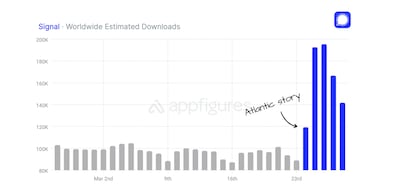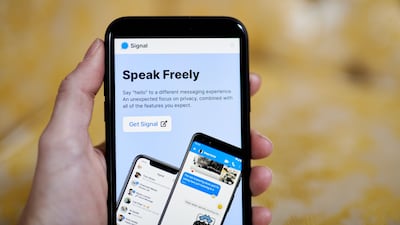Anger over US military plans being disclosed to a journalist on a Signal Messenger group chat proved too much for US National Security Adviser Mike Waltz to survive in the role, but the app at the centre of his reported downfall has largely been helped by the scandal.
As of Thursday, Signal sits comfortably with a top 15 ranking in Apple's iOS app store in the social networking category. Notable for an app that rarely, if ever, advertises.

This comes weeks after Jeffrey Goldberg, editor-in-chief of The Atlantic, inadvertently learnt specifics about US plans for attacks on Houthi targets after he was added to a Signal chat.
Mr Goldberg said he was mistakenly added to “Houthi PC small group” within the Signal app, which often promotes its independent status and emphasises its encryption and security features.
According to Appfigures, an app intelligence and analytics company, shortly after the Signal story broke, app downloads for the messaging platform rose by 26 per cent.
“The news wasn't great or relevant to the app yet it resulted in Signal getting 350,000 more downloads than what was expected,” read a press release from Appfigures, which also said that the app's popularity in Yemen, the country at the centre of the attacks discussed on the platform, briefly rose too.

In the days following the scandal, military officials, members of Congress and technology security experts expressed shock and dismay by the incident for which Mr Waltz ultimately took responsibility.
Despite the apology from Mr Waltz, a former Florida congressman, criticisms remained, and an investigation by the US Inspector General got under way to determine the ramifications of Trump administration officials' use of Signal.
On Signal's official message board, debate and deliberation about what the potential fallout meant for the platform continued for weeks after the story first broke.
“Do you think this US scandal will benefit Signal in terms of adoption of the app or cast it in a bad light?” asked one of message board members.

“I think it is free advertising and therefore good for Signal Messenger,” wrote another poster to the Signal message board. “It is a good reminder that … good apps cannot protect from bad users.”
The scandal and fears of a possible compromise of national security became so great that Signal warned of “misinfo flying around” about the messaging app.
“Signal remains the gold standard for private, secure communications,” the company wrote on X, hitting back against various reports suggesting the app could be vulnerable due to phishing attempts.
“Phishing isn’t new, and it’s not a flaw in our encryption or any of Signal’s underlying technology. Phishing attacks are a constant threat for popular apps and websites.”
Signal boasts “state of the art, end-to-end encryption”, but experts have since warned that such features matter little if the app's users are careless.
“Often the Defence Department will urge against using these apps for secure communication because humans will be humans and they can't be trusted to use it correctly,” Robert Graham, chief executive of Atlanta-based cyber security company Errata Security, told The National. “That was verified by this whole story – a journalist was accidentally added to the group.”
But some, like Signal's founder Moxie Marlinspike, poked fun at what many saw as a very serious incident.
“There are so many great reasons to be on Signal. Now including the opportunity for the Vice President of the United States of America to randomly add you to a group chat for co-ordination of sensitive military operations,” he posted on X in March. “Don’t sleep on this opportunity.”
As of 2024, before the controversy erupted, estimates showed Signal had some 70 million monthly active users. The leader, WhatsApp, has about 2 billion.
Shortly after news broke on Thursday surrounding Mr Waltz's departure, US President Donald Trump named Secretary of State Marco Rubio as the acting national security adviser, and then nominated Mr Waltz as ambassador to the UN.



